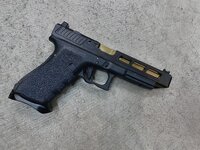- Messages
- 220
- Reactions
- 209
What is up, everybody?
So, I "pulled the trigger" and signed up for my first shooting match.
Going to the Practical Pistol at DDRC on April 1st.
Any advice is welcome as I have zero experience with competitive shooting.
What to take? How many rounds? What to expect?
Attached is the picture of the gun I pretend to use.

So, I "pulled the trigger" and signed up for my first shooting match.
Going to the Practical Pistol at DDRC on April 1st.
Any advice is welcome as I have zero experience with competitive shooting.
What to take? How many rounds? What to expect?
Attached is the picture of the gun I pretend to use.












